Undergraduate Alumni
Our alumni pursue diverse careers from healthcare to agriculture to research. Read on to hear from a few recent graduates from Molecular Genetics...
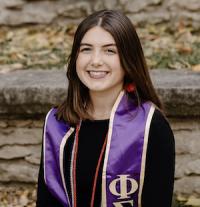
Katie Clark graduated Magna Cum Laude with Research Distinction in Molecular Genetics. While at OSU she pursued research in the Hopper lab for nearly her entire time at OSU. She says "I was honored to receive multiple awards and fellowships while at OSU, including the Thomas J. Byers Memorial Scholarship and Jim Hopper Memorial Scholarship through the Department of Molecular Genetics. The ability for my research to be supported through OSU and the Molecular Genetics department allowed me to continue my research during the summers between academic years, ultimately culminating in me being able to write and defend an undergraduate thesis for research distinction in Molecular Genetics."
What are your plans for after graduation?
Following graduation, I will be attending the Medical Scientist Training Program at University of Texas Southwestern as an MD/PhD candidate. Prior to starting the program at UT Southwestern, I am working as a consultant with UPMC Enterprises on their Translational Sciences Core team. My role on the team includes developing primers on the mechanisms behind RNA-based therapeutics and investigating new companies in the RNA space.
How did Molecular Genetics prepare you for your current path?
The Molecular Genetics department has prepared me to succeed in all aspects of my career. Over the years, I have received an immense amount of support from my professors, mentors, and peers that has allowed me to grow as a student, researcher, and person. I was challenged in my classes and able to learn about complex topics that I can directly apply to my post-grad work. Likewise, being involved in research as an undergraduate proved to be an incredible advantage in the application process for MD/PhD programs. I also had multiple opportunities within the department to present my research, which developed my presentation skills and allowed me to receive feedback from both students and faculty on how to advance my research.
What was your favorite class (or who was your favorite professor or what was your favorite experience) and why?
My favorite classes were Cell Biology (MG 5607) and Human Genetics (MG 4703). The content covered in MG 5607 built an incredible foundation for understanding multiple aspects of cell biology and exposed me to topics of study within Molecular Genetics that I plan to continue studying as I pursue a PhD. Human Genetics was an exceptional course and should be taken by all Molecular Genetics students. For the duration of our undergraduate education we are exposed to the science behind various genetic disorders and Dr. Cole builds off of the technical knowledge to incorporate a more empathetic and personal approach to genetics. It can be easy to forget the correlation between the science we learn as students and the impact it has on people in the world: Human Genetics does an incredible job bridging the two.
What experiences at OSU stand out for you?
In addition to research, I was a brother in the Beta Iota chapter of Phi Sigma Pi, a gender-inclusive honor fraternity at Ohio State. Phi Sigma Pi was a great way to meet students across all majors, as well as gain useful leadership experience. Throughout my time in the organization I served as the Public Relations chair, Historian, and Scholarship chair.
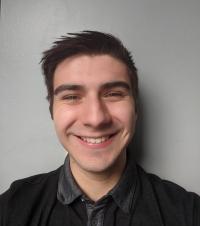
Mitchell Ticoras graduated Summa Cum Laude in 2022 with a BS in Molecular Genetics and minors in History and Environmental Science, and with Honors Research Distinction in Molecular Genetics. During his time at OSU, Mitchell was highly engaged in research in the Hamel Lab, was awarded the Goldwater Scholarship, the Astronaut Scholarship, and earned numerous other fellowships to support his research activities. He offers the following advice to new majors "First, never be afraid to ask for help. It may seem like everyone is busy all the time, but if you send an email to a professor or advisor chances are they will make time to help you... If you join the Mol Gen Club group chat and ask a question someone will always help you out."
What are your plans for after graduation?
Immediately following graduation, I will be journeying to Liège University in Belgium to continue pursuing my research interests (redox chemistry and energy production in plants). I was fortunate enough to be awarded money from the Erasmus+ program supported by the European Union and will work with Dr. Claire Remacle and OSU’s own Dr. Patrice Hamel for the next year before pursuing graduate school.
How did Molecular Genetics prepare you for your current path?
First, the department’s overwhelming support for undergraduate research was integral to me feeling comfortable starting research early on in my time at OSU. There are many professors who actively look for undergrads to help with their lab work and who also treat those students with respect and patience. Second, the diversity of the classes required for the major and the different model systems discussed in those courses helped me realize what topics I find intriguing and, perhaps more importantly, the ones I do not care for at all. Lastly, I think the faculty advisors provided by the MGD are a fantastic resource. Oftentimes, I would meet with my advisor and talk about classes and scholarships. However, we would also discuss what I wanted to do after graduation and what I should be doing now to reach my post-graduation goals. Many departments do not have faculty advisors or just have one for all their students. I cannot overstate the positive impact these meetings had on me over my four years at OSU.
What was your favorite class and why?
I enjoyed MG 5800 and MG 3436 a lot. In the former, it was a small class (16 students) in which we read and discussed papers each week. Every few weeks you would be the "expert" on the paper and present it with a couple of peers to the class. The fact that the papers were complex and that you got to really engage with fresh material was exciting and a nice change from generic textbook/PowerPoint learning. MG 3436 was great because it covered material I had never learned before. A lot of classes cover content that you may have touched on before, but MG 3436 was all about plant topics I had never interacted with previously. Even though we did not learn about subjects that I am super intrigued by it was nice to learn a bunch of new things each class!
What experiences at OSU stand out for you ?
I think my favorite non-research experience at OSU was not any specific class but participating in Molecular Genetics Club. The MGC organizes research presentations for students from faculty, industry experts, and clinicians in addition to hosting social events for students interested in genetics. Through the MGC I connected with other passionate undergrads and learned more about research opportunities while networking with other students, professors, and business professionals in a casual environment (which never hurts). I also did a lot of research on campus! I worked with Dr. Patrice Hamel and my post-doctoral/PhD mentors Dr. Nitya Subrahmanian and Dr. Andrew Castonguay focusing on energy production within cells. I won quite a few fellowships/awards which helped me pay for school and living expenses, and enabled me to keep working in the lab during the semester.
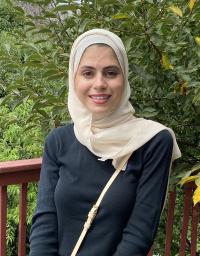
Diana Hallak graduated in Spring 2021, Magna Cum Laude with Honors research Distinction in Molecular Genetics, while completing minors in General Psychology and Medical Pharmacology. She took a gap year working as a researcher ot OSU prior to enrolling in the College of Medicine at OSU to pursue her M.D. degree.
What did you do after graduation?
After graduation, I continued working in Dr. Noah Weisleder’s lab as a full-time research assistant studying the molecular mechanism of GNE Myopathy. I got to present my work at multiple conferences, and the highlight of them for me was my oral talk at the Experimental Biology conference. I was also able to use my time after graduation to travel both internationally and domestically as COVID restrictions allowed. I also ran two half marathons, one of which was in Dubai! During this year, I was fortunate enough to interview for medical school and I’ve decided in the fall I will be attending my top choice school: The Ohio State University College of Medicine!
How did Molecular Genetics prepare you for your current path?
Being a MolGen undergraduate at OSU equipped me with a very strong science foundation that allowed me to confidentially take on studying for the MCAT and applying to medical school knowing I love and understand the science required for these endeavors. Beyond that, the molgen program does a fantastic job of fueling our curiosities. The incorporation of journal clubs within some of the classes allowed me to have a deeper understanding of the topics and allowed me to approach my classes inquisitively rather than just trying to memorize all the material for a good grade. I greatly appreciate the program’s emphasis on research and problem solving as that helped me grow into a more confident student ready to start medical school.
What was your favorite class and why?
I truly enjoyed every genetics class I took at OSU. But when it comes to favorites the Human Genetics course (4703) taught by Dr. Cole comes on the top. Not only is Dr. Cole one of the best professors I’ve ever had, but the material is truly very interesting. We got to study different genetic diseases including the mapping of the disease, animal models, and therapies by reading and discussing primary literature. The course was challenging to me. The good kind of challenging; the kind that leaves you with a deeper understanding of the material and a curiosity that makes you look up papers and spend hours wanting to learn more about the topics beyond what the course required.
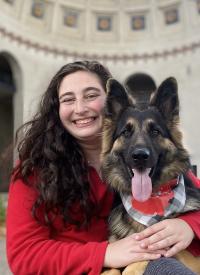
Hailey Magenheim graduated in Spring 2021 with combined Bachelor's and Master's degrees in Molecular Genetics. She graduated Magna Cum Laude and with Honors in Arts and Sciences. She is currently enrolled in the Veterinary School at OSU.
What did you do after graduation?
I am currently a veterinary student at The Ohio State College of Veterinary Medicine. I would love to use my background in genetics to help produce healthier animals as well as treat animals who are sick.
How did Molecular Genetics prepare you for your current path?
The Molecular Genetics program helped prepared me to be a veterinarian. By studying complex pathways in classes I was able to gain a better understanding of biological systems. In the program, I constantly read primary literature and presented the findings, which provided insights and dialogue to prepare me to adjust to the ever-changing field of medicine as a veterinarian. Finally, the Molecular Genetics department trained me to think through problems in a logical manner. In class when presented with challenging problems, we were taught how to break problems down and then determine what types of tests could lead us to an answer. In my first year as a vet student, this skill has been invaluable as I contemplate problems, differentials, and what diagnostics would be most applicable.
What was your favorite class and why?
Dr. Christin Burd and Dr. Craig Burd's MOLGEN 5300 Cancer Genetics class was a favorite. Cancer genetics was connected the molecular scale with the clinical side of cancer. Dr. Christin and Dr. Craig Burd were extremely enthusiastic about the subject and made learning the information fun and memorable. The course ended with a group project where we utilized resources and presented to the class our patient data and shared our recommended best course of treatment.
What experiences at OSU stand out for you?
Ohio State is large and diverse and offers many opportunities to learn and grow. My involvement in many different aspects of campus allowed me to meet many different people and create a close community. Through the local Guiding Eyes for the Blind chapter, I raised five future guide dogs for the visually impaired as well as assisted in training many other dogs. Our weekly meetings and occasional speakers reinforced how the dogs that we raised changed lives. I was fortunate to even become a summer intern at the Guiding Eyes headquarters in New York where I worked with the genetics and veterinary teams to breed and care for the future guide dogs. As an Honors Community Advocate and Resident Advisor, I assisted first and second year students find their place on campus and make Ohio State their home. Additionally, as a volunteer at the Ohio Wildlife Center in the greater Columbus community, I gained first hand experience caring for sick or injured wildlife.
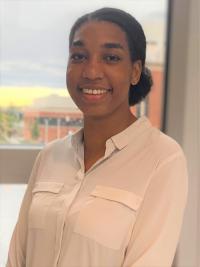
Shannon Grey graduated in 2020 with a double major in Molecular Genetics and Zoology and with Distinction in Research. After graduation she worked for two years as a Research Associate in a lab in the James Cancer Center, and then applied to M.S. programs in Genetic Counseling.
What did you do after graduation?
After graduation, I worked for two years as a research assistant in Dr. Christin Burd’s laboratory studying aging and melanoma. I performed a series of experiments on mouse models with mutant NRAS/BRAF to see the effects that ultraviolet light has on melanoma formation. I also worked with melanoma patients in Ohio State’s skin cancer clinic to study the impact of biological aging on immunotherapy discontinuation. Currently, I am attending the University of Pennsylvania to obtain a Master of Science in Genetic Counseling.
How did Molecular Genetics prepare you for your current path?
Molecular Genetics prepared me very well for the application process for graduate school. I was able to take a multitude of classes with a wide range of topics in genetics. From improving my skills on reading scientific papers to learning different laboratory techniques, I gained many tools during my time in the department. I feel very comfortable starting as a graduate student from the information I learned as a MolGen major.
What was your favorite class and why?
My favorite class was Cancer Genetics with Dr. Christin Burd and Dr. Craig Burd (although I may be biased). I remember it was very easy to follow along and the material I learned is still useful to me to this day. The Burds are really a dynamic duo who know so much about the field of cancer biology! I also loved Human Genetics taught by Dr. Susan Cole. Human genetics is my favorite area of genetics so everything I learned in the class was very intriguing! The material taught in the class will be very helpful in my career as a genetic counselor.
What experiences at OSU stand out for you?
I was a part of an organization called the Boo Radley Society for all four years of undergrad. The club focuses on performing random acts of kindness across Ohio State’s campus. We did different events throughout the year, from High Five Friday in the Oval every week to passing out candy during finals week. Not only did I meet the most amazing people, but the organization really taught me to focus on my mental health.
Did you do research in a campus lab or earn any awards/fellowships/recognitions while you were at OSU?
I was a double major in Molecular Genetics and Zoology, so I did undergraduate research in the Evolution, Ecology, and Organismal Biology department. I worked in Dr. Andreas Chavez’ laboratory where I studied the mito-nuclear discordance between the northern and southern populations of white-tailed antelope ground squirrels (Ammospermophilus) in the Baja California peninsula. During the years in the lab, I was awarded with several travel grants where I was able to present posters at conferences all over the country.
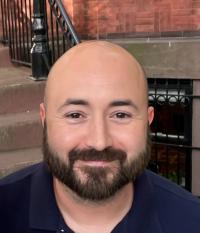
Joe Beljan graduated in 2020 with degrees in Biology and Molecular Genetics. He returned to OSU in 2017 to finish a bachelor’s degree in Biology, however soon after returning he fell in love with genetics and decided to continue his education while performing undergraduate research in the lab of Dr. Sharon Amacher. He received the Elizabeth Wagner Scholarship and Mayers Summer Research Fellowship for his research into genetic modifiers of Duchenne Muscular Dystrophy (DMD), graduating with Research Distinction in Molecular Genetics.
What did you do after graduation?
Currently (Summer 2022), I’m a second year graduate student in the Molecular, Cellular, and Developmental Biology program at OSU. I am performing my graduate research in the lab of Dr. Kevin Flanigan at Nationwide Children’s Hospital, Center for Gene Therapy, investigating novel therapeutics for a rare mutational class of DMD patients. I plan to earn my PhD, with a focus in molecular biology and genetics, to then work as a research scientist in the biotech industry. My goal is to help develop gene therapies to treat genetic diseases.
How did Molecular Genetics prepare you for your current path?
Molecular Genetics is difficult, but it’s also wonderfully intricate and complex. Studying genetics taught me how to deal with one detail at a time while still keeping the larger picture in focus. As a graduate student, I juggle simultaneous projects and experiments which each require attention to detail, as well as integration into larger long-term objectives. My Molecular Genetics degree not only provided me fundamental knowledge in my field of interest, but it also taught me how to think and approach problems like a scientist.
What was your favorite class, who was your favorite professor, and why?
My favorite class was Microbial Genetics, taught by Dr. Matthew Anderson. It was one of my most challenging courses. I learned an incredible amount about the molecular basics of genetics and how cellular machinery interacts with DNA and RNA. I still fall back on some of the basics I learned in that class when thinking about what’s physically happening during a given cellular process. I can’t pick a single favorite professor, but I will say the Molecular Genetics program at OSU is outstanding. Almost every class I took was taught by a professor with an obvious passion for the material and teaching students.
What experiences at OSU stand out for you?
My undergraduate research was instrumental in my early development as a scientist, and I was blessed to have such an amazing mentor, Dr. Sharon Amacher. I credit the research and her guidance as the most important and influential parts of my undergraduate experience at OSU. Thank you Sharon!
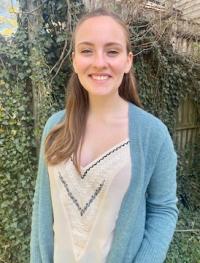
Ava Willoughby graduated in Autumn 2020 Summa Cum Laude, with Honors in Arts and Sciences. During her time at OSU, she was active in undergraduate research, and in service activities. After a gap semester, she started the Master's program in Genetic Counseling here at OSU.
What did you do after graduation?
After graduation, I interviewed for genetic counseling programs and was admitted into the program here at Ohio State. I was fortunate enough to have the spring off between graduating and starting the program in the fall in order to take a step away from academics – I was able to travel and just have time to breath and re-center my passion for genetics prior to diving into graduate school. It’s normal to experience burnout through undergrad and graduate school so having some time off allowed me to start the next phase of my education fully recharged. I recommend this to anyone contemplating about further education after undergrad!
How did Molecular Genetics prepare you for your current path?
The molecular genetics undergraduate program at Ohio State has truly provided me with a robust foundational knowledge about genetics, and specifically the underlying molecular mechanisms of human disease. This foundation has set me up for great success in continuing to understand human genetics and problem solving during clinic. Conversations about bioethics were also well-covered in many of the classes I took, so I felt like I truly left with well-rounded knowledge of the genetics field.
What was your favorite class and why?
I absolutely loved all of the electives I took through the molecular genetics department, so it’s hard to choose just one. But I would have to say that my favorite class has to be Cancer Genetics (5300) because I find myself constantly recalling the information I learned through it. In that class, I was always learning new things, the content has really stuck with me, and it’s helped me stand out in my cancer genetic counseling skills.
What experiences at OSU stand out for you?
Being involved in Camp Kesem is what really defined my passion and identity during my undergraduate career. Camp Kesem is a nationwide organization (I was part of the chapter at OSU) that provides year-long support for children impacted by a parent’s cancer. Mainly, we provide them with a free week-long summer camp that allows them to just be a kid again and connect with other kids going through similar things. It was truly an honor to be so involved in this organization and I definitely recommend that any undergraduate at OSU check it out, especially if they are interested in working in the cancer field in the future – it’s lifechanging for both the kids and the counselors.
I also worked in Dr. Amanda Toland’s lab as a freshman and sophomore. I was mainly involved in helping to determine the clinical validity of polygenic risk score usage for determining more precise lifetime breast/ovarian cancer risk estimations for women with BRCA1/BRCA2 pathogenic variants. I also worked as a genetic counseling intern at the Cleveland Clinic the summer going into my sophomore year, and then worked as a cancer genetic counseling research assistant for Robert Pilarski, MS, LGC starting my sophomore year, and I’ve actually continued similar work through graduate school. All of these experiences really helped to supplement the knowledge I was gaining through my schoolwork. I felt like having exposure to the real-world applications of human genetics while I was learning the concepts really helped solidify my understanding.
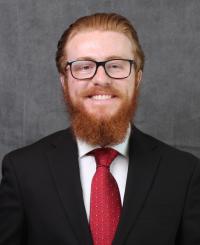
Ian Binns graduated in Autumn 2020 with a B.S. in Molecular Genetics. He is currently enrolled in the OSU school of optometry, where he is earning a combined OD/MS degree.
What did you do after graduation?
I am currently (Summer 2022) a second year student at The Ohio State College of Optometry. I was recently admitted into the college’s combined OD/MS program, in which I will be earning my Doctorate of Optometry alongside a Master’s of Vision Science. My masters research is investigating whether or not typical clinical binocular vision testing techniques are significantly affected by the use of a suppression check in patient populations with and without binocular vision issues. I am currently conducting my research in binocular vision under the guidance of Dr. Marjean Kulp, an optometrist who also earned her BS in genetics here at Ohio State.
How did Molgen prepare you for my current path?
The molecular genetics curriculum truly challenged me while being infectiously interesting. It built the foundation for the proper analytical thought processes required to succeed at various levels of academia. The rigorous course work prepared me for my career as a professional student while also differentiating my knowledge base from many other students in the applicant pool. Although I did not participate in undergraduate research while at OSU, the passion of my fellow classmates and professors for their research piqued my curiosity and was a large factor in my decision to pursue a Master’s degree that would afford me the opportunity to conduct research of my own. Lastly, the breadth of knowledge that the molecular genetics curricula instilled in me has built a greater understanding of the many heritable modalities of ocular disease, which will translate to better patient care as a clinician.
What was your favorite class?
My favorite class was Human Genetics taught by Dr. Susan Cole. I always knew that I wanted to pursue a career centered around patient care and this course introduced the many ways that the human genome can influence our health. This course felt the most applicable to my future career in optometry, and we even discussed the variable inheritance patterns of retinitis pigmentosa, a heritable degenerative eye disease that often results in blindness.
What experiences at OSU stand out for you?
No singular experience at OSU is responsible for the amazing experience that I had, but rather the comradery of fellow students and truly caring professors make Ohio State the welcoming community that that we call home. There were countless times when I would be lost in the world of the MAP kinase kinase kinase cascade or trying to wrap my brain around how CRISPR works for the first time and my professors or classmates would meet my confusion with understanding and willingness to help me further my knowledge. This willingness to help one another is what made my time at OSU so special.
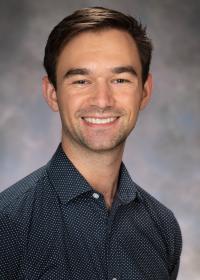
George Kyle graduated in 2020, Magna Cum Laude and with Honors in Arts and Sciences. He completed an MS in Genetics Counseling in 2022 and is currently employed as a Genetic Counselor at Nationwide Children's
What did you do after graduation?
After graduation I applied to genetic counseling graduate programs and was matched to the OSU Masters of Genetic Counseling Program! I recently graduated in May and am now working as a laboratory genetic counselor at Nationwide Children's Hospital.
How did Molecular Genetics prepare you for your current path?
Molecular genetics provided me with exposure to all sorts of opportunities available after graduation. One that stood out to me was genetic counseling. My undergraduate classes were a great foundation for the genetics knowledge required in my graduate program, and all the prerequisite courses needed to apply for programs were part of the Molecular Genetics curriculum.
What experiences at OSU stand out for you?
One of my favorite experiences was my study abroad experience in Norway (Molgen 5797 "Introduction to Biomedical Laboratory Sciences") learning about analysis of biological samples, genetic sequencing technologies, and ethic considerations of whole exome, and whole genome sequencing.
Did you do research in a campus lab or earn any awards/fellowships/recognitions while you were at OSU?
During my time at OSU, I volunteered as a student research assistant in the Burghes Lab. I was responsible for maintaining mice colonies as well as genotyping new mice to determine SMA status.
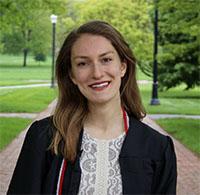
Sabrina Bulas: Sabrina graduated Summa Cum Laude in 2019 with a BS in Molecular Genetics, and minors in entrepreneurship and Spanish. She was a 2-time recipient of the Eleanor Ruffing McMahon Scholarship for conference travel, as well as the Maximus Scholarship, the Carole Hershey Walters Scholarship, and the Huntington International Fellowship. Her summer research was funded through the Crawley Research Scholarship. She would like to give an enormous thank you to the myriad of professors who supported her throughout her time at OSU, including but not limited to: Dr. Baldwin, Dr. del Sarto, Dr. Herman, Drs. Burd, Dr. Cole, Dr. Chamberlin, and Bill Diffenderfer.
What are your plans for after graduation?
I will be pursuing my MD at the Perelman School of Medicine at University of Pennsylvania. I hope to involve myself in academic medicine as a clinician who both sees patients and conducts genetically-targeted clinical research aimed at honing our treatments of chronic diseases.
How did Molecular Genetics prepare you for your current path?
MolGen gave me the ability to think mechanistically and critically analyze complex biological processes. My pathway thinking skills have developed with each class I took. Unlike many other specializations, MolGen classes are predominantly problem-set based, a characteristic which has honed my ability to work in groups to understand disease pathology and research validation of findings.
What was your favorite class and why?
Human Genetics (4703) with Dr. Susan Cole was my favorite MolGen course, followed by Cancer Genetics (5300) with Drs. Christin and Craig Burd. Human Genetics gave me extensive exposure to primary literature, and now I'm able to read, summarize, and criticize complex research findings in half the time it took at the inception of the semester. Dr. Cole engaged the class in discussions about the ethics of gene therapy and the clinical applications of genetic findings, which made me think about the grey areas clinicians must tackle when utilizing patients' genetic information. Cancer Genetics gave me an appreciation for the fact that cancers are different diseases (in plural), and exposed to me immunological genetically-targeted treatments like CAR T-cell therapy that I hope to become involved in as a clinician.
What experiences at OSU stand out for you?
In undergrad I was involved in TEDxOhioStateUniversity, serving as the Director of Logistics my senior year in order to execute a 13-speaker and 1200-audience member TEDx conference on campus. Through TEDx I also volunteered with All THAT, an after school program for at-risk high schoolers; Refuge, where I coached a high school refugee to give a TED-style talk; and Marion Correctional Facility, a male prison. I was a four-year member of Collegiate Club Triathlon and competed twice for OSU at Nationals. OSU also gave me the opportunity to study abroad: once in Budapest, Hungary and a second time in Valencia, Spain for linguistic immersion.
On the research side, I worked in Dr. Abdel-Rahman's lab investigating the epigenetics of uveal melanoma tumorigenesis, which culminated with a presentation at the 2019 ARVO annual conference in Vancouver. I was a clinical researcher at Cincinnati Children's Hospital for three years in pediatric ophthalmology and rheumatology with Drs. Utz and Kaufman, and I presented at the 2017 AAO annual conference in New Orleans. I also have an oral presentation of the project at the 2018 Denman Undergraduate Research Forum.
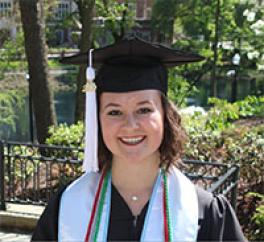
Gabrielle Ernst: Gabrielle graduated Cum Laude in 2019 with a major in Molecular Genetics and a minor in Global Public Health. During her time here she conducted extensive research in the James Cancer Center, and was awarded a Pelotonia Undergraduate Fellowship to support her research. After a year in the Roychowdhury lab, Gabrielle enrolled in the MS program in Genetic counseling in 2020.
What are your plans for after graduation?
After graduation I will be working in Dr. Sameek Roychowdhury’s lab at Ohio State University’s Comprehensive Cancer Center which focuses on precision cancer medicine. From here, I plan to apply to Genetic Counseling master's programs in the fall.
How did Molecular Genetics prepare you for your current path?
Molecular Genetics is a challenging, applicable, and eye-opening field that has allowed me to understand the complexity of so many diseases on a molecular level. This field has given me a strong foundation of knowledge and understanding for the research I did in my undergraduate career and the research I will do in the future. Further, it has prepared me with a strong background in the field of genetics that I will carry on into my graduate work in genetic counseling.
What was your favorite class and why?
My favorite class and professor was Human Genetics with Dr. Cole. Her class opened my eyes to the complexity and the range of diseases and disorders that can affect our body. Understanding this scope through a few diseases only furthered my passion for science, research, and helping those with these conditions. Additionally, Dr. Cole challenged us to think deeply about the many components involved in various diseases and the ethical decisions that must be made in order to help patients. Overall, she allowed us to explore our creative scientific minds while teaching us the importance of understanding all factors involved in a patient’s disease.
What experiences at OSU stand out for you? Out of all of the incredible experiences I had at Ohio State, one experience that stands out more than any was my undergraduate research in Dr. Caligiuri’s lab and my continued research in Dr. Freud and Dr. Mundy-Bosse’s labs. During my time in these labs, I gained a wealth of knowledge and skills that have prepared me for my future work in Dr. Roychowdhury’s lab and as a genetic counselor. My work with Innate Lymphoid Cells and their interaction with Acute Myeloid Leukemia was an incredible experience that not only allowed me to further our fight against cancer, but taught me more about patience, perseverance, and determination than I could ever imagine. Through my research I was awarded the Undergraduate Pelotonia Fellowship where I had the chance to talk to people from all backgrounds about my work as well as ride for an incredible cause devoted to ending cancer. Without my research and the people who have mentored me along the way, I wouldn’t be who I am or where I am today.
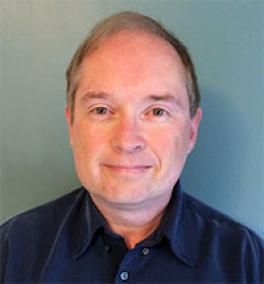
Jason Galloway: Jason graduated Summa Cum Laude in 2019 with a degree in Molecular Genetics. This was actually Jason’s second OSU degree – he earned a BS in Chemical Engineering in the 90s and was a successful engineer and business owner for many years before returning for a degree in Molecular Genetics. He offers the following advice to Incoming students “your major will become your career; make sure you find the work interesting, meaningful, and enjoyable. That's more important than a big salary! This is my second degree; my first was a "smart" career choice that I didn't enjoy and ultimately left. You'll be spending a huge chunk of your life working, and it will be hard to have a happy life if you don't have a rewarding career.”
What are your plans for after graduation?
I will be entering Dartmouth medical school this fall.
How did Molecular Genetics prepare you for your current path?
As a pre-med student, MolGen was an excellent degree. With the rise of personalized medicine and the need to understand and explain the links between genetics and disease, a solid understanding of genetics is increasingly important in modern healthcare. I think depth of knowledge of genetics will be a big differentiator between the old and new generations of doctors, and I'm happy that I'm well prepared. But also, it's an impressive degree that gave me lots to talk about in interviews; there's no shortage of exciting developments in genetics to discuss (new cancer treatments, epigenetics, the microbiome, to name a few), and interviewers really like to see genuine enthusiasm. Anything that distinguishes a candidate in the competitive world of med school applications is a huge plus, and I think my degree choice served me well.
What was your favorite experience and why?
I've had some wonderful classes at Ohio State, but my favorite experience has been research. I did two projects - one with Dr. Linda Weavers in Environmental Engineering, and another with Dr. Christin Burd in Molecular Genetics. With Dr. Weavers, I helped uncover evidence of widespread fluorochemical pollution in an Appalachian community on the Ohio River. The work, although not yet published, has already led the EPA to mandate better pollution control at the responsible facility, so I have the satisfaction of knowing I've made a difference in the lives of people in an underserved community. With Dr. Burd, I helped investigate the links between aging and response to immunotherapy in melanoma patients. The work has yielded unexpected results that I am very hopeful will make an important contribution to cancer research, and it was really fun to dig deep into the literature and try to understand the meaning of what we found. Both Dr. Weavers and Dr. Burd are fantastic mentors; I feel lucky to have had them.
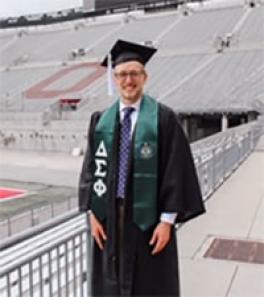
Zachary Kauffman: Zachary graduated in 2019 with a BS in Molecular Genetics and a Minor in Microbiology. He cites undergraduate research as one of his most important undergraduate experiences. His research earned a 2nd place award in the “Toward Precision Cancer Medicine” category at the 2018 Denman Research Forum. He also graduated with Research Distinction in Molecular Genetics for successfully defending his undergraduate thesis on how transcription factors impact cancer-causing pathways. In 2020, Zach joined the PhD program in Cancer Biology at the Carbone Cancer Center at UW-Madison.
What are your plans for after graduation?
I will be working as a Research Assistant 1-B/H in Dr. Lapo Alinari's lab in the Wexner Hematology department while preparing to apply to PhD programs in one of the next few cycles.
How did Molecular Genetics prepare you for your current path?
The Molecular Genetics curriculum introduced me to topics that would become my main research interests like cancer genetics, signaling pathways, and epigenetics.
What was your favorite class and why?
Cancer Genetics (MG 5300) was far & away my favorite class. Drs. Christin & Craig Burd are amazing researchers who inspire every one of their students to discover all that they can about the expansive field of cancer biology. I committed to pursuing admission into a Cancer Biology PhD program after finishing the first month of this class.
What experiences at OSU stand out for you?
Undergraduate research was the single most impactful activity I did at OSU. Research in two labs in the Biomedical Research Tower, including one led by MG faculty member Dr. Wayne Miles, helped me to understand my purpose in life.
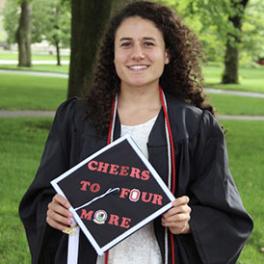
Mackenzie Owen: Makenzie graduated in 2019 with a BS in Molecular Genetics and a Spanish Minor. She completed undergraduate research in neuroscience, first in the lab of Christine Beattie and then at Cincinnati Children’s Hospital over two summers through their Summer Undergraduate Research Fellowship (SURF), earning an Honorable Mention for her poster presentation at the SURF Capstone Presentation during my sophomore year. During her junior year, Makenzie was awarded OSU's Biological Sciences Alumni Society Scholarship, and she managed to squeeze in two study abroad opportunities as well!
What are your plans for after graduation?
I am very excited to be staying in Columbus after graduation and will be starting medical school at The Ohio State University College of Medicine in August!
How did Molecular Genetics prepare you for your current path?
I switched my major to Molecular Genetics after my freshman year and it was one of the best decisions I made during undergrad. MolGen provided me with a strong foundation in biological, cellular and disease processes as well as the mechanisms underlying each. It was challenging, allowed me to become a better critical thinker and taught me to apply learned concepts to new scenarios. MolGen also gave me the opportunity to get involved in research, which I hope to continue during medical school.
What was your favorite class/professor?
Dr. Cole was my favorite professor and I had the opportunity to take two classes with her (Molgen 4606 and Molgen 4703). Dr. Cole inspired me to become passionate about molecular genetics and its applications in the healthcare setting as well as everyday life. Her classes were engaging, funny and she truly cares about the success of her students.
What experiences at OSU stand out for you
I was lucky to have more memorable experiences at OSU than I can count, but some of my particularly great memories include: painting up with Block O to stand at the front of the student section during football games, being a Team Captain for BuckeyeThon, volunteering as an ambassador at the Wexner Medical Center and studying abroad in Madrid, Spain and Valparaíso, Chile. I am so excited to continue forming great memories with my Buckeye community over the next four years.
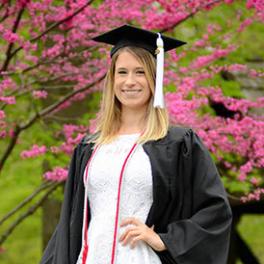
Aubrey Rose: Aubrey graduated in 2019 with a major in Molecular Genetics and a minor in Clinical Psychology & Individual Differences. She began undergraduate research in her sophomore year, and completed an Honors Thesis in the lab of Dr. Noah Wiesleder. During her time at OSU, she was awarded the Mayers Summer Research Scholarship through OSU’s Office of Undergraduate Research and Creative Inquiry to support her undergraduate research during the summer. She presented her research at several venues, and won first place in the Innovations in Health Science category at the 2019 Denman Undergraduate Research Forum.
What are your plans for after graduation?
I will be attending the University of South Carolina to earn my Master’s in Genetic Counseling.
How did Molecular Genetics prepare you for your current path?
Molecular Genetics helped me explore careers in genetics to find the one that fit my interests. These classes were crucial in preparing me for a career in genetic counseling. The coursework gave me a strong background in genetics. Because not many schools have a genetics major, I think this set me apart during the application process. This background also sets me up for success in the classes needed for my Master’s degree.
What was your favorite class and why?
My favorite class was definitely Human Genetics with Dr. Cole (MOLGEN 4703). Since I’m going into genetic counseling, learning about human genetic inheritance was relevant to me, and we even talked specifically about genetic counseling in class. I loved the material covered and the presentation style really helped me retain the information. Dr. Cole is one of my favorite professors here at OSU and she did an amazing job teaching the course.
What experiences at OSU stand out for you?
The two experiences that most stand out for me are my research and my involvement in the Undergraduate Genetic Counseling Club (UGCC). I’ve been working as an undergraduate researcher since my freshman year and completed an independent research project in Dr. Noah Weisleder’s lab. I presented a thesis on this project that allowed me to graduate with honors research distinction in molecular genetics. I was involved with the UGCC since the beginning of my junior year. This club taught me more about genetic counseling and connected me with other future genetic counselors who I know will be lifelong friends.
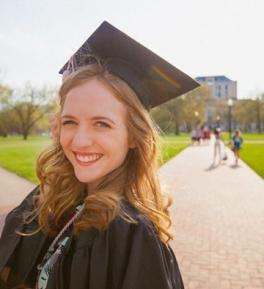
Leah Anderson: Leah graduated from OSU in 2017 with degrees in Molecular Genetics and Music performance. She completed a senior thesis in the lab of Dr. Mark Seeger, and along the way picked up numerous undergraduate fellowships, as well as poster awards from the 2017 Midwest Drosophila Meeting and the 2018 National Drosophila meeting. In 2020 Leah joined the PhD program in Genome Science at the University of Washington.
Where are you now, and what are your plans?
I'm still living in Columbus. I am the lab manager in the Anderson lab in the Micro department. I am currently studying the interaction of infectious yeast with mammalian macrophages. My plan is to apply for Ph.D. programs in genetics next year!
How did Molecular Genetics prepare you for your current path?
MolGen gave me both the knowledge and research experience I need for my future as a Ph.D student.
What was your favorite class and why?
My favorite class was Genes and Development (Molgen 5608). We learned about the coolest genetic pathways in that class! I also loved the Trondbuss study abroad program (Molgen 5797). I learned so much about the intersection between genomics, ethics, and genetic counseling, while also getting to experience Norway!
What experiences at OSU stand out for you?
The research I did as an undergrad was a very critical part of my education. My thesis research focused on the genetics of neural development in Drosophila. I also studied music while at OSU, and I was a part of the OSU Symphony Orchestra and a string quartet. In my free time, I was a member of the Swing Dance Club, the Bike Club, and Urban Gaming Club, and I also enjoyed climbing at the OSU rock wall!
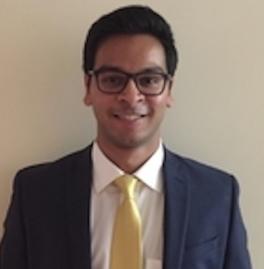
Advait Deshmukh: Advait graduated with honors in 2018 with a major in Molecular Genetics and a minor in Microbiology. He completed independent research in the lab of Dr. Guramrit Singh. He says “Choosing Molecular Genetics as my major was by far one of the best choices I made in college. It provided the framework I needed to become successful. Whether it’s getting a PhD, getting a medical degree, or any other career path, Molecular Genetics will improve the way you think and approach problems. Highly recommend it as a focus of study!”
Where are you now, and what are your plans?
I am currently attending medical school at the University of Toledo College of Medicine and Life Sciences. I’ll be starting my medical career here for 4 years and then will move onto residency after that. The length of my residency will depend on which specialty I choose!
How did Molecular Genetics prepare you for your current path?
Molecular Genetics gave me a very good foundation for the sciences and how the contribute to disease. Every disease can be traced back to its cellular level and is determined by the molecular defect that is happening. Molecular Genetics gave me a good look at how much of the basic science is conducted in making scientific breakthroughs that can lead to understanding disease pathophysiology.
What was your favorite class (or who was your favorite professor) and why?
My Human Genetics class (Molgen 4703) taught by Dr. Cole was my favorite class. It really cemented my desire to go into the medical field. Learning about how defects at the molecular level can cause disease on the organismal level was really fascinating.
What experiences at OSU stand out for you?
My time in my fraternity was a very defining time period for me. It helped me grow both as a student and as a person outside of academics. Being surrounded by a 100 different fraternity brothers who always have the best in mind for me really showed me that I am well supported. This has improved my confidence in myself for both school related and non-academic activities.
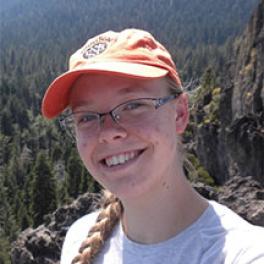
Sophie Friesen: Sophie graduated in 2017 with a BS in Molecular Genetics with Research Distinction and Honors. They completed an undergraduate Honors Thesis in the lab of Dr. Susan Cole, where they received support from a Mayers Scholarship in the summer after their junior year, and a URO Academic Year scholarship during their senior year. Their research resulted in an authorship on a published manuscript, and they graduated as a member of Phi Beta Kappa.
Where are you now and what are your plans?
I’m a second-year graduate student in the Molecular and Cell Biology program at Berkeley. In Dr. Iswar Hariharan’s lab, I study how sheets of cells signal to each other to coordinate organ growth, using fruit flies as a model organism. I’ve also started teaching as a graduate student instructor. My post-grad school career plans are still up in the air; I can see myself being happy in either academia or biotech. I’ve still got a couple years to figure that out, though!
How did Molecular Genetics prepare you for your current path?
I feel like my classes gave me a solid background in the scientific tools that are available to uncover the genetics behind biological processes, and started teaching me how to read scientific papers (which I sure do a lot of now!). However, the most valuable preparation I got for grad school was working in a lab and writing an undergraduate thesis. I studied microRNA regulation of skeletal development in Dr. Susan Cole’s lab. There, I became familiar with the nuts and bolts of developmental research: not just how to run a gel and do in situ RNA hybridization, but how to organize data, find and analyze scientific literature, and communicate my science effectively, which skills continue to be critically useful. My undergraduate research also taught me that science involves a great deal of failure: negative results, unexpected complications, and sometimes simple mistakes. That’s just part of the research process- after all, if every experiment gave the expected result, there’d be no reason to do experiments.
What experiences at OSU stood out for you?
I’d like to give a shout out to Allies for Diversity, a dialog group that focuses on topics of diversity and acceptance. I only started attending this group in my junior year, and I wish I’d found them as a freshman. There are a lot of subtle- and not so subtle- ways that our society is stacked against people of color, queer and trans* people, immigrants, people in minority religions… the list goes on, but step one in trying to change things to make a more equitable society is to raise awareness, and Allies does a great job of that. Also, the community is really fantastic. I met folks through Allies that I truly consider to be family.
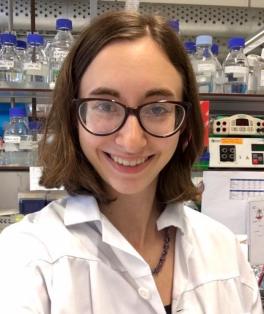
Maya Gosztyla: Maya graduated from OSU in 2017 with degrees in Molecular Genetics and Neuroscience. She completed a senior thesis in the lab of Dr. Mark Seeger, and along the way picked up numerous undergraduate fellowships from OSU. She also was awarded the Goldwater Scholarship and the Astronaut Scholarship, and received a fellowship from the U.S. Embassy of Switzerland that funded her summer research internship in Switzerland. In Autumn of 2019, Maya joined the Biomedical Sciences Ph.D. program at UC San Diego, and in 2021, she was awarded a prestigious NSF-funded Graduate Research Fellowship.
Where are you now, and what are your plans?
I am currently working as a post-bac researcher at the National Center for Advancing Translational Sciences (part of the NIH). I plan to start a PhD program in neuroscience next year and study the molecular mechanisms of neurodegenerative diseases.
How did Molecular Genetics prepare you for your current path?
I double-majored in neuroscience and molecular genetics. For me, this combination made perfect sense because I wanted to understand the function of the brain all the way down to its molecular intricacies. I think understanding the fundamentals of how genes and cells work makes it much easier to understand larger organ systems.
What was your favorite class and why?
My favorite class was probably Cell Biology (Molgen 5607). I really enjoyed learning the nitty-gritty of cellular function and understanding how different levels of complexity could layer on top of each other.
What experiences at OSU stand out for you?
I participated in research for all four years of undergrad and ended up writing an Honors Thesis. It was probably the most important factor that shaped my overall education and current career goals. I also became the Editor-in-Chief for an international undergrad research journal called the Journal of Young Investigators, which taught me a lot about academic publishing and how to write for interdisciplinary audiences.
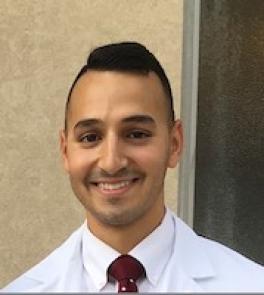
Yannis Hadjiyannis: Yannis graduated in 2017 with a degree in Molecular Genetics and research distinction. During his time in the department he was awarded a prestigious Pelotonia Fellowship to support his research in the Leone lab, and was selected into the 110th class of the SPHINX senior class honorary.
Where are you now, and what are your plans?
Currently, I am a second-year medical student at The Ohio State University College of Medicine (OSUCOM). My current fields of interest are pathology, anesthesiology, and med-peds. However, our rotations during our third and fourth year will help with making that decision. In the meantime, I am planning to take a research year after our national exam in may and have been assessing different research opportunities throughout the country.
How did Molecular Genetics prepare you for your current path?
Molecular genetics was a challenging, research-based major that more than prepared me for the rigors of the OSUCOM curriculum. The fundamentals of molecular genetics I learned in the major have been continuously a part of our education throughout the organ-system based approach at the OSOCUM. Additionally, the major offered the opportunity for numerous research experiences and laboratory opportunities. Through these experiences and the excellent staff in the department, I was able to develop my passion for scientific inquiry that has guided me throughout my education and current path into medicine.
Who was your favorite professor and why?
This is a tough question as I was fortunate to receive instruction from several great professors throughout my time in the major. However, Dr. Susan Cole and Dr. Gustavo Leone stand out in my mind as some of my favorite professors. Most notably, Dr. Cole was able to inspire me in a way no other professor was able to at the beginning of my education in my first molecular genetics class. In her classroom, she routinely tied in real-world examples of experiments and scientific breakthroughs that served to bolster our understanding and garner our fascination. Moreover, Dr. Cole went above and beyond in the classroom and outside of it to provide students with the utmost opportunity to learn the material and generate community within the major. Indeed, her dedication and passion for Molecular Genetics was contagious.
In regards to my time with Dr. Leone, I was able to witness the practical benefits of molecular genetics in medicine and challenged to conduct groundbreaking research at an early point in my education. Dr. Leone, now the director of the Hollings Cancer Center, was a prominent PI at the Comprehensive Cancer Center that inspired me to join him in solving some of the profound mysteries in molecular genetics through his research lab and effort. Through this multi-year experience, I was pushed to master my education and I was constantly inspired by witnessing the results of our experiments and his passion. In line with this, I was able to take independent study classes on the E2F family of transcription factors and pursue a research thesis through his lab and the molecular genetics department.
What experiences at OSU stand out for you?
When I reminisce about my undergraduate education several experiences, that I will forever cherish, come to mind such as the joy of the BuckeyeTHON dance marathon, crossing the finish line during the 180-mile bike ride in Pelotonia, or singing Carmen Ohio with friends and family. However, the one thing that I will never forget about my experience at OSU is the passion, joy, and opportunity provided by The Ohio State University and the even larger community it has built. The enthusiasm and opportunity I witnessed on campus, during my undergraduate education, for a diverse number of fields was electrifying and something I will always remember. Indeed, every Buckeye on campus is provided the opportunity to explore an endless amount of experiences with constant encouragement and support.
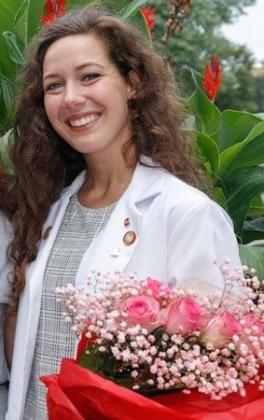
Shannon Halloran: Shannon graduated from OSU in 2017 with honors in Molecular Genetics. Her research in the lab of Dr. Michael Ostrowski resulted in an authorship on a published paper examining cell signaling in pancreatic cancer.
Where are you now, and what are your plans?
I am currently a second year student in the Doctor of Pharmacy program at The Ohio State University College of Pharmacy. I will graduate with my PharmD in May 2021. I have not yet narrowed down to what kind of pharmacy setting I would like to practice in, but I am excited about a lot of different possibilities!
How did Molecular Genetics prepare you for your current path?
One area of pharmacy in which I am interested is pharmacogenomics, a rapidly expanding field. Molecular genetics gave me a great foundation to understand the complex ways in which genetics can affect drug response. Many things I learned about in my molecular genetics classes have reappeared in my pharmacy classes as possible drug targets or genes that influence a patient’s response to a medication.
What was your favorite class and why?
Two of my favorite classes at OSU were in the molecular genetics department. One class I really enjoyed was MOLGEN 4703 Human Genetics taught by Dr. Cole. We looked at various genetic disorders and used them as examples of different types of genetic inheritance or expression. I also really enjoyed a MOLGEN 4591S, which is a service learning class. In this glass we would go to high schools in the Columbus area and teach students about DNA and run a “crime scene investigation” that involved running gel electrophoresis with the students. I enjoyed that class so much I actually took it twice!
What experiences at OSU stand out for you?
I was in the honors program, and I took advantage of the embedded honors classes offered in the molecular genetics department. I took both MOGLEN 5607E and 5608E, and they each included an additional recitation. The extra recitations only had a handful of students and we got a lot of practice with primary literature. We also got to know our professors better in these smaller sessions.
I also did research for 2 years at OSU. I worked in a lab that studied the tumor microenvironments in both breast and pancreatic cancers. I learned a lot during my time doing research, and I was even able to earn class credit. I also was an author on a paper titled “Genetic Ablation of Smoothened in Pancreatic Fibroblasts Increases Acinar-Ductal Metaplasia,” that was published in the journal Genes & Development in September 2016.
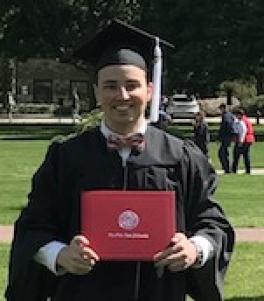
Benjamin Schott: Benjamin graduated from OSU in 2017 with a degree in Molecular Genetics with research distinction. He completed a senior honors thesis in the lab of Dr. Susan Cole, where he was awarded two consecutive OSU Summer Research Fellowships. Ben was also a National Buckeye Scholar, a Provost Scholar, and a Keith and Linda Monda International Experience Scholar.
Where are you now, and what are your plans?
Currently, I am a second-year PhD student in the University Program in Genetics and Genomics at Duke University in Durham, North Carolina. I am studying how human genetic variation confers differential susceptibility to infectious disease and disease outcomes in Dennis Ko’s lab. Upon completion of my PhD, I hope to remain active in the genetics research community whether in an academic or industrial setting.
How did Molecular Genetics prepare you for your current path?
The Molecular Genetics Department at Ohio State bolstered my interest in molecular biology and gave me the tools to succeed as a researcher in molecular genetics. The skills and knowledge I acquired as a molecular genetics student and as an undergraduate researcher in the department gave me a strong foundation to build a career in the field.
What was your favorite class and why?
My favorite course at Ohio State was MolGen 5607, a cell biology course led by Paul Herman. The course material was extremely interesting – it provided a deep dive into the inner workings and structure of cells and their organelles with an emphasis on key signaling pathways and the genetic approaches used to unravel those pathways.
What experiences at OSU stand out for you?
My undergraduate research in Dr. Susan Cole’s lab was a beneficial and formative experience for me. I worked on a project investigating glycosylation of Notch ligands and its functional relevance in signaling. I also engaged in a short study abroad program, Biological Roots in England (now titled Scientific Roots in Europe), which included a spring break trip through London, Lyme Regis, and Cambridge University. My favorite experiences were the tour of Charles Darwin’s estate outside of London and The Eagle Pub in Cambridge where Watson and Crick proclaimed they had “discovered the secret of life” during lunch in 1953.
